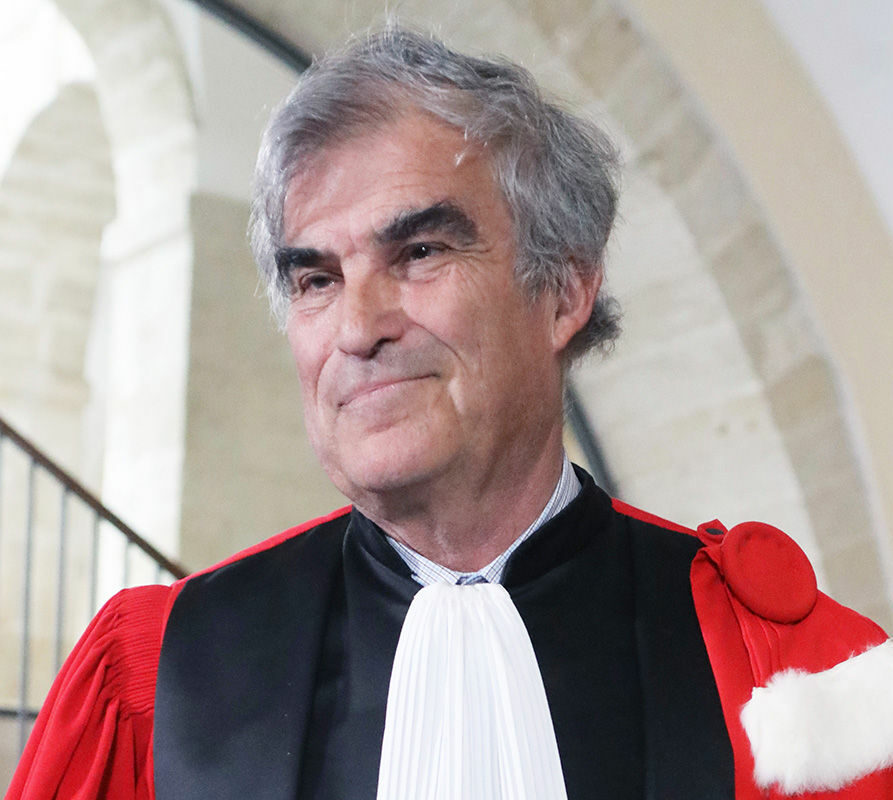Once upon a time, there was François Ost
It was under the patronage of Alexandre Viala, professor of public law at UM, that the University of Montpellier had the honor and pleasure of welcoming Belgian François Ost to award him an honorary doctorate. Portrait of this jurist and philosopher of law who excels in the art of explaining the law in order to better understand it.

Yves Cartuyvels, a legal researcher at the Facultés universitaires de Saint-Louis-Bruxelles, described his colleague and compatriot François Ost asa"thinker of the in-between." A thinker of coherence, a thinker of balance, a thinkerof"connections"—this is how the man to whom the University of Montpellier has just awarded the prestigious title of Doctor Honoris Causa defines himself. This is recognition of an exceptional academic career that this committed and curious Belgian citizen has built as one builds bridges. Bridges between law and philosophy, between law and the environment, and between law and literature too.
Law and philosophy
It was during the turbulent 1970s that François Ost, a young man from Brussels, enrolled in law school "by family tradition," as he confided in an interview entitled: François Ost, all horizons of law. However, the grandson of international law professor Charles de Visscher had a "secret wish": to study philosophy. He ultimately devoted his life to these two disciplines, "with a view to opening up the study of law and reflecting on its relationship with society," emphasizes Alexandre Viala, professor of public law at UM, director of Cercop, and sponsor of this honorary degree ceremony. Works suchas What is the purpose of law? and Le droit ou l'empire du tiers (Law or the Empire of the Third Party), published this year, testify to this ongoing desire to decontextualize law in its uses and purposes.
In the early 1980s, with a thesis in philosophy of law under his belt—which focused on the mythological excesses of legal rationality—François Ost began his teaching career as a professor at the Saint-Louis-Brussels Faculty of Law, where he served as dean from 1982 to 1993. He also taught at the European Academy of Legal Theory, which he founded in 1989, as well as in Geneva, at the Collège de France, and at the University of Montpellier, where, in close collaboration with CERCOP, he established a university degree in philosophy of law in 2002.
Law and the environment
At the same time, the lawyer continued his research work, giving it a deeply interdisciplinary dimension that was reflected in the editorial line of the Revue Interdisciplinaires des études juridiques (Interdisciplinary Journal of Legal Studies), which he founded in 1978. In it, he developed "a critical perspective, a perspective that was constructed, enriched, and sharpened by interdisciplinarity, whether through philosophy, economics, sociology, psychology, psychoanalysis, or ecology," recalled Carine Jallamion, Vice Dean of the Faculty of Law of Montpellier, during the formal ceremony. Ecology is a particularly important theme in François Ost's career. The Center for the Study of Environmental Law, which he founded in 1989, offers the very first training program in environmental law in French-speaking Belgium.
"In the 1980s, I was part of a generation that, rightly or wrongly, probably wrongly, believed that social problems had been solved and were being addressed by the welfare state, but that we needed to take stock of another threat, namely the ecological threat," François Ost said in the same interview. He then published La nature hors la loi or Quel avenir pour le droit de l’environnement ?
The lawyer also applies this ecological awareness to his civic engagement. He joined the board of directors of Greenpeace, where he served for ten years before creating, with friends, the Foundation for Future Generations, where he still chairs the board today. "Very often, when you're in the thick of things, you lack perspective. Conversely, when you're at university, you sometimes lack a foothold in reality. We can see how fruitful the go-between role between academic expertise and civic engagement can be for both," he sums up when asked about the dual dimension he gives to his work.
Law and literature
A third pillar underpins François Ost's thinking: the link between law and literature. An "unlikely marriage, even a dangerous liaison," comments the academic, who for years illustrated legal cases with examples taken from literature. It was ultimately by looking to the United States that he found inspiration in the "Law and Literature" movement, which he brought to the university faculties of Saint-Louis, first in the form of a course, then through numerous publications .Raconter la loi, aux sources de l'imaginaire juridique(Telling the Law: At the Sources of the Legal Imagination) Shakespeare, the comedy of law, Faust or the Frontiers of Knowledge and Sade and the Law, are just a few examples of his work on the subject.
Theater is also part of his repertoire, and the play Antigone voilée (Antigone Ve iled) gave him the opportunity to revisit the issue of the veil and the yardstick of this mythological figure of resistance to oppression. More recently, François Ost has continued his exploration of the links between law and literature in the form of short stories with the 2019 publication of the collection Si le droit m’était conté (If the Law Were Told to Me) and Nouveaux contes juridiques in 2021. "Telling stories about law in order to better understand it, considering it as a culture rather than a technique, approaching it from the perspective of the case and not just the rule, that is my answer to the question 'Why stories?'"concludes the man on whom the University of Montpellier can now count.
